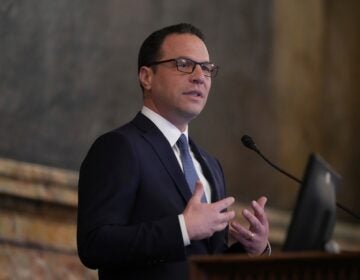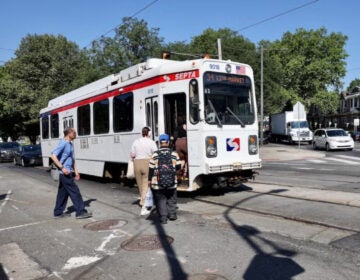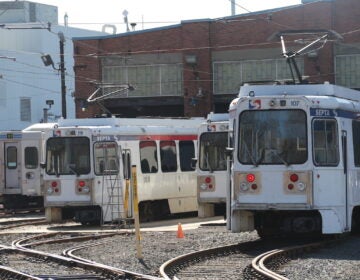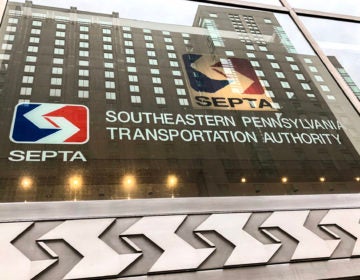SEPTA shifts budget to keep service running as state funding stalemate nears 4th month
SEPTA said it will postpone buying new buses, upgrades to the Bristol Regional Rail Station and a new facility at its Frazer Railroad site.
Listen 0:49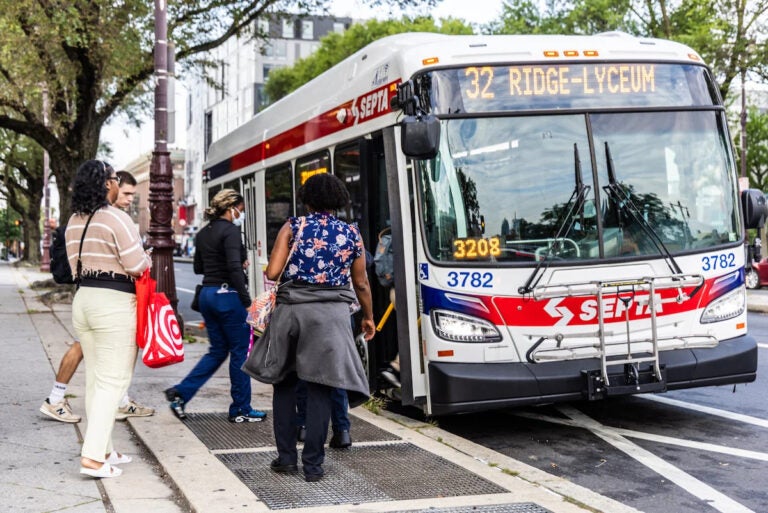
File: Philadelphians board the 32 bus. (Kimberly Paynter/WHYY)
From Philly and the Pa. suburbs to South Jersey and Delaware, what would you like WHYY News to cover? Let us know!
As Pennsylvania nears the fourth month without a budget, SEPTA has announced it will postpone multiple improvement projects to continue service, as well as transfer $394 million to its operating budget.
SEPTA’s board voted Thursday to shift funds from its capital budget, which is typically earmarked for facility upgrades and improvements, to prevent further service cuts. The decision follows PennDOT’s emergency approval last month to restore full service after earlier budget cuts caused the Philadelphia-area transit system to scale back operations. A Philadelphia judge ordered the agency to reverse the 20% service cuts, which included the elimination of 32 bus routes.
“The Board supports these project deferrals because they do not compromise safety by stopping crucial repairs,” SEPTA Board Chair Kenneth Lawrence Jr. said in a statement. “We also do not want to disrupt projects that are already underway, including the replacement of the Market-Frankford Line [L] and Trolley cars.”
An agency spokesperson said other critical projects — from bridge and track replacements to other vehicle purchases — could be impacted if disputes continue.
Below are the projects SEPTA is postponing as a result of Thursday’s decision:
- The purchase of 247 new hybrid diesel-electric buses within three years ($256 million)
- A project designed to bring Bristol Station on the Trenton Line into compliance with the Americans with Disabilities Act ($46 million)
- The final phase of an expansion to the Frazer Railroad Facility ($39 million)
- The purchase of hydrogen- and electric-powered buses for SEPTA’s zero-emission pilot program ($41 million)
- The retrofitting of existing hybrid buses to run exclusively on electric power ($11 million)
SEPTA has already paused 44 planned infrastructure projects to save $1.8 billion. The combined 49 projects represent more than $2 billion worth of deferred work, adding to over $10 billion in needed repairs and upgrades across the system, according to SEPTA.
“Using capital funds for operations keeps us moving today, but it pushes those critical investments further down the road,” General Manager Scott Sauer said in a statement. “We stand ready to continue working with leaders in Harrisburg to develop a long-term solution that addresses both our operating needs and the capital investment so critical to our future.”
This comes as SEPTA faces delays on its Regional Rail lines following an emergency order from the Federal Railroad Administration after several recent train fires. The agency is temporarily removing two or more cars from service at a time to complete federally mandated inspections and make safety modifications. According to SEPTA spokesperson Andrew Busch, 82 of the system’s 225 Silverliner IV cars have been inspected so far.
“We are completing about 8 cars per day,” Busch said in an email. “We don’t have a set end-date for completion, and we are continuing to discuss our options with the FRA as the October 31 deadline approaches.”
Across the river, NJ Transit received the first of 175 new buses earlier this month. The remaining vehicles will be delivered by the end of next year as part of an ambitious modernization program to improve service.

Get daily updates from WHYY News!
WHYY is your source for fact-based, in-depth journalism and information. As a nonprofit organization, we rely on financial support from readers like you. Please give today.



